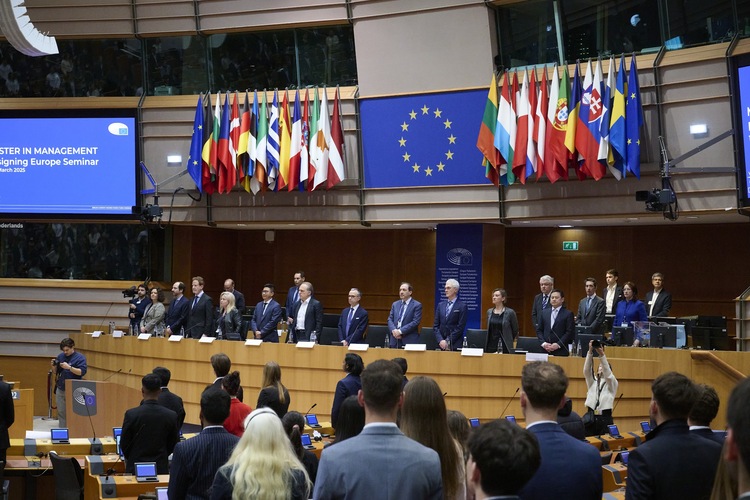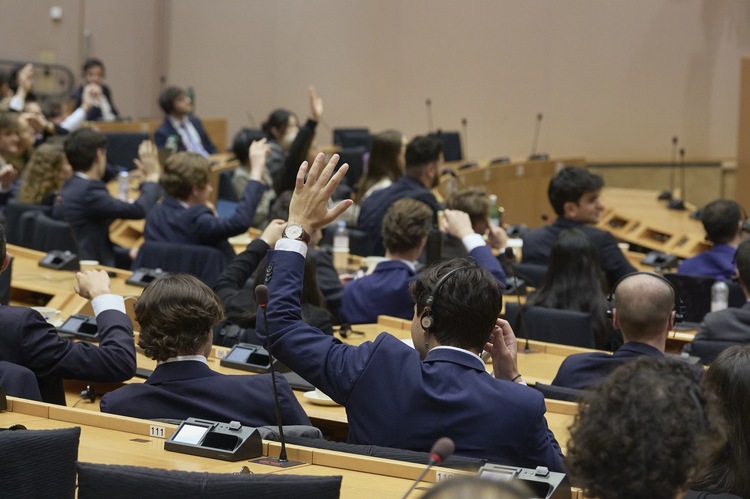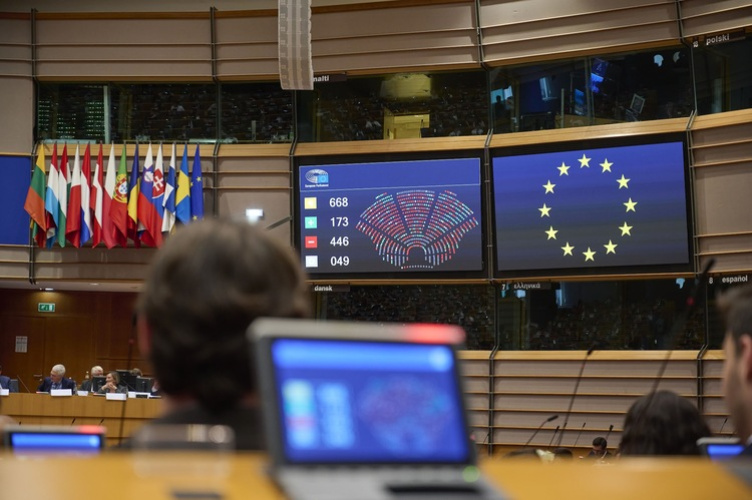Inside ESCP’s immersive seminar at the heart of European decision-making
As Europe reflects on its shared journey this Europe Day, the question of how to sustain unity, innovation, and competitiveness is more pressing than ever. At the heart of this challenge are the future leaders who will shape Europe’s next chapter — and business schools like ESCP play a vital role in preparing them.
With its deep European roots and spanning six campuses across the continent, ESCP has made the commitment to European values a cornerstone of its educational mission. A vivid example of this commitment is Designing Europe, a unique module within the Master in Management (MiM) programme. Over four months, students immerse themselves in the workings of European institutions, culminating in a high-level simulation at the European Parliament.
According to Yves Bertoncini, ESCP professor and pedagogical coordinator of the module, the experience is both academic and profoundly civic: “Whether they were born on the European continent or not, whether they plan to work there or not, all ESCP students will be exposed to the policies and decisions of the European Union throughout their lives and careers. This is why it is necessary for them to understand its foundations and how it works, and then to be able to influence and ‘design’ it.”
Designing Europe 2025: preparing future leaders through EU policy simulations

Through a combination of policy workshops, expert sessions, and negotiation exercises, Designing Europe fosters more than theoretical knowledge, it nurtures a deep, experiential understanding of European citizenship. “Designing Europe is truly an initiatory process,” Bertoncini explains. “Students experience unity in diversity in a context that is both democratic and pluralistic. They learn to put forward ideas that are not necessarily their own, build alliances, and reach compromises — just like real European policymakers. This is also the value of the working sessions and votes organised in the committee rooms and the European Parliament’s Hemicycle, which embody and crystallise this academic and civic experience, further increasing the ‘return on investment’ for ESCP and its students.”
For Alessandro Fiume, a first-year MiM student, this immersion was transformative. “What really motivated me was the fact that this was a once-in-a-lifetime opportunity to actually step into the shoes of the people who make decisions for us in Europe,” he says. “It wasn’t just about watching them; it was about becoming them — playing the role of adults who literally shape our future.”
The simulation’s setting in the European Parliament Hemicycle lent a tangible gravity to the students’ debates. “There was no warm-up — we had to jump straight into it,” Alessandro recalls. “Each party had to quickly come together and prepare to present their ideas the very next day. It showed the importance of teamwork under pressure and how fast decisions need to be made while staying aligned.”
Mathilda Kools, another MiM participant, experienced similar challenges and growth. “I had to become president of a party whose views I had not previously considered aligning with,” she recounts. “And I had to speak in front of 700 people. As someone who struggled with public speaking, it was a big leap, but the positive feedback I received really opened my eyes. It taught me to listen to arguments I didn’t necessarily agree with, and to become more open-minded.”
Both students came away with a more mature view of Europe. “This seminar showed me how fragile unity in Europe can be,” says Alessandro, “especially in the current geopolitical climate. It’s clear that our generation has a huge role to play in strengthening Europe — economically, socially, and politically.” Mathilda adds, “Europe is about balancing everyone’s interests. Experiencing just 100 students debating made me realise how challenging it is. Yet, given all these complexities, it’s incredible how well Europe functions.”
Higher education as a driver of European competitiveness
For ESCP, the connection between business education and European engagement is natural. “Training in management predisposes students to think strategically on a European scale,” says Bertoncini.“The European Union is a space of free movement, creativity, and innovation — and a major economic power. Understanding and contributing to its development is crucial for future leaders.”
The 2025 edition of Designing Europe focused on strengthening European competitiveness, echoing critical reflections across the continent. “Most startups end up moving to the US or Canada because of lower taxes and better funding opportunities,” notes Mathilda. “We debated how businesses can stay and thrive in Europe, how to leverage European funding, and how to bridge the gap between Brussels and small businesses across the continent.”
This real-world challenge links business, policy, and innovation. It’s a live demonstration of how academic institutions can serve as a platform for European economic thinking.

The European Union is a space of free movement, creativity, and innovation — and a major economic power. Understanding and contributing to its development is crucial for future leaders.
Empowering the next generation: the role of youth in Europe’s future
The future of Europe cannot be designed without youth. As policies like the European AI Act reshape sectors from tech to finance, business schools must ensure students are ready to engage, not just as professionals, but as citizens.
“What this seminar really revealed,” says Alessandro, “is how necessary it is to understand how Europe functions — and how to influence it from the inside. That’s what Designing Europe helped us do.”
Mathilda agrees: “Every decision is connected to what happens at the European level. Knowing how to navigate this landscape gives you an advantage — not just as a business leader, but as a citizen.”
Through immersive simulations, strategic reflections, and democratic collaboration, ESCP is helping students bridge the classroom and the real world, preparing them for impact that transcends sectors and borders.

Strengthening Europe’s future through business education
Through Designing Europe, ESCP is preparing its students not only to excel in global business but also to be active contributors to the European project. As Bertoncini puts it, “Every year, I see curiosity, professionalism, and a real desire to engage among our students. Their gratitude and hope are the best rewards, and a sign that Europe’s future is in good hands.”
As the continent looks ahead to new challenges and opportunities, institutions like ESCP are building a generation equipped to shape, strengthen, and reimagine that future. This is the future of Europe through business education — and it’s already unfolding, one engaged student at a time.
FAQs
Designing Europe is a civic-academic module in ESCP’s Master in Management programme, where students engage in EU policy simulation exercises at the European Parliament.
It spans six campuses, operates in multiple languages, and reflects the European Union’s diversity and synergy.
It prepares leaders to understand and influence the systems that govern innovation, economics, and society.
Policy literacy, negotiation, public speaking, coalition-building, and strategic foresight in real institutional settings.
Campuses
